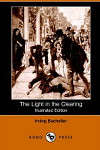Charles Dickens – Great Expectations
Posted 6th April 2012
Category: Reviews Genres: 1860s, Drama, Social
1 Comment

Because the grass is always greener on the other side, isn’t it?
Publisher: N/A (but I’d wager Vintage’s a good one)
Pages: N/A
Type: Fiction
Age: Adult
ISBN: N/A (Vintage’s is 978-0-099-51157-1)
First Published: 1860-1861
Date Reviewed: 2nd April 2012
Rating: 4/5
Pip, brought up in a relatively poor family, meets a convict and, soon after, a rich woman who was jilted at the altar and has ever since lived in the moment she found out the wedding was off, one shoe on one shoe off mouldy bridal cake and all. In meeting the crazy Miss Havisham, Pip first turns his thoughts to the idea of becoming a gentleman, and when he is told of a fortune due to be his, he leaves for London, confident of Miss Havisham’s kindness and her daughter, Estella’s, hand in marriage. Pip knows he’s not to speak to his patron of the fortune bestowed on him, and he complies, but why should he not thank Miss Havisham?
There is little doubt that while there are many problems with this book – least not the reams of unnecessary writing – Dickens’s story of a self-righteous misunderstanding boy is universally relevant and a well-explained example of why such things need to be reassessed by anyone coming close to behaving like any one of the characters.
The main plot, of Pip’s physical, mental, and emotional journey from blacksmith’s apprentice to landed gentleman incorporates a vast number of themes in and of itself, and be it that the “visual” focus that commands the attention is the literal happenings, it is the subtext that drives the reader on. Pip’s continual waiting, doing very little for the several years that fall between his being propelled to higher society and the arrival of his benefactor to his notice, is cause for thought. Pip doesn’t do anything with his money because he is waiting for the notice of who his benefactor is, and it would also be okay to assume that there was a thought in his mind that the very well off do not work, at least not in his day. That he gives money to a friend is commendable but it’s rather interesting that by the end of the book, the situation that Pip is in would have been eased somewhat if he had applied himself when he had been able to do so. Dickens shows that one should make the best of opportunities, realise them to the “max”, but never forget your friends because you never know when you might need them. Pip is rather like the prodigal son of the Gospel, spending all his money. And aren’t Joe and Biddy, those whom Pip scorns, the ultimate of unconditional love while the girl he loves is the complete opposite? It takes the twist in the story for Pip to start changing.
Change is rather necessary. While the characters in Great Expectations serve purposes beyond their entertainment value, such as Miss Havisham, though eccentric, illustrates how revenge gone too far can have bitter consequences, it is surely only the very forgiving reader who would be able to say they liked more than half of them. Indeed while the split is equal, the less palatable people have a tendency to accost more memories in the reader than the compassionate ones, such is the variety in their personalities and the way they demonstrate their disdain. So the development of Pip, that from straddling both sides of the fence he moves more fully into a single territory, is a most welcome aspect of the book. Not only does Pip’s development give cause for personal celebration, it also allows the reader to see how brilliant Dickens is with characterisation. The plot may be very good, but the book is character driven.
Yet while Dickens may have a basic sub textual conclusion to make, he doesn’t condemn either sort of life. He has a laugh at many of his characters, but while he may appear to find London unsavoury, the way in which Pip does not realise the potential in his life shows that a good life can be found in either.
The reader looking for the definitive will find that there were two endings written for the book. The original ending is well worth finding because of the vast difference in direction that is portrayed.
Structure is where one must call in the word “mud”. The word “mud” being called in because it is used so often in the best example of where Dickens goes wrong. The word “mud” being used a third time and a repetitive sentence demonstrating this further – if not already apparent, the issue here is wordiness. Dickens drones on terribly at times. While some of the narrative is quick, other parts move as slowly as Pip’s boat does and only then because Dickens takes so long in describing the water that the people in the boat likely took to watching the Thames water evaporate while waiting for him to get a move on. Maybe all that mud was apparent because Dickens had taken so long in the first place. The wordiness is understandable given that Great Expectations originally appeared in a magazine and had a word count, but that doesn’t mean it is easy to overlook.
Sometimes Dickens is predictable, aided of course by the stereotypical elements found in Victorian literature, but at others he is completely surprising. Of course a lot of the success of the latter, and the acknowledgement of the former, will likely rely on whether or not the reader is familiar with the stereotypes, knew the plot beforehand, or knows nothing at all.
Dickens is credited as being both a comedian and a gothic writer of depressing words, but although the decision of which book to read may rest on the mood of the audience, the blend of sadness and hilarity in Great Expectations make it a suitable choice for both the seasoned fan and the novice. There are some awful moments in the book but take the chapter devoted to the Pocket family and see the satirical humour on high society and lesser means explode in a wonder of genius and perceptiveness.
Great Expectations may put off potential admirers by its verbosity and often-dull writing, but those cases are a literal loss for words. Despite the problems and slow moments, the book stands out as one to be remembered and if it has been obliterated by education then at least it is easy to see why teachers have chosen it.
And it doesn’t hurt if Aged P’s replies to his son mirror your own grandfather’s.
Related Books
1 Comment
Comments closed


























April 12, 2012, 12:22 pm
An interesting review. I think like you, I found Dickens over-writing a little tiring after a while, and could have done without certain passages. However, there are some great characters and the plot is poignant.
My review: Great Expectations by Charles Dickens
Charlie: Hi Matthew, I can only agree with you about the plot and characters, there is a lot of depth to both, and the characters mean so much more than they seem to at first. I should probably add a quote about the Pocket house somewhere, however, because that chapter was an absolute delight from start to finish.